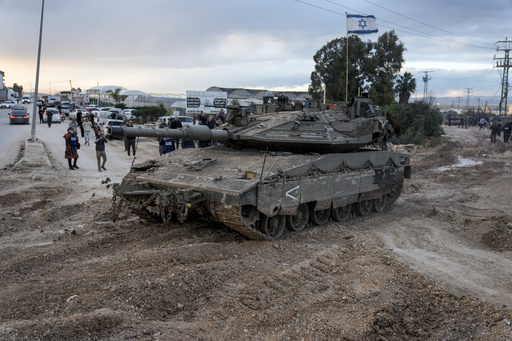
JENIN, West Bank — In a significant escalation, Israeli tanks have entered the occupied West Bank for the first time since 2002, following a statement from the Israeli defense minister indicating that military presence in certain areas will likely persist for “the coming year.” The minister also suggested that Palestinians who have fled these areas may not be allowed to return.
On Sunday, reporters witnessed a small number of tanks advancing into Jenin, a city that has long been emblematic of the armed resistance against Israel. As the Israeli government intensifies its operations against Palestinian territories, it has expressed a determination to eradicate militancy amid a rise in violent incidents. The current operations in the northern West Bank commenced on January 21, just days after a ceasefire in Gaza began, and have extended to surrounding regions.
Many Palestinians perceive these military incursions as an effort to reinforce Israeli dominance over the West Bank, where approximately 3 million Palestinians live under military governance. The ongoing raids have resulted in significant destruction within urban communities.
Israeli Defense Minister Israel Katz declared that he and Prime Minister Benjamin Netanyahu have instructed the military to amplify its actions to combat terrorism across all refugee camps in the West Bank. “We will not allow the return of residents, and we will not permit terrorism to resurge or expand,” he stated firmly.
Katz also noted that he had ordered military preparations for a possible extended presence in certain urban refugee camps, indicating that around 40,000 Palestinians have fled these areas, creating near-empty neighborhoods. The United Nations corroborated this statistic. These camps are predominantly inhabited by descendants of Palestinians who either fled or were forcibly displaced during conflicts with Israel decades ago.
The duration of the restriction on the return of these Palestinians remains uncertain. Netanyahu indicated that Israeli forces would sustain their presence for an indefinite period as necessary. The last occurrence of tank deployment in the territory dates back to 2002 during a severe Palestinian uprising.
The Palestinian foreign ministry condemned these Israeli movements, labeling them “a dangerous escalation” in the West Bank and urged the international community to intervene against what it considers illegal aggression by Israel. Netanyahu is facing increasing pressure to act firmly in response to rising militancy in the West Bank amid the ongoing conflict in Gaza.
Under interim agreements facilitated in the early 1990s, Israel retains control over vast sections of the West Bank, while the Palestinian Authority governs other regions. Although Israel frequently sends troops into Palestinian territories, they typically withdraw after completing their objectives. The United Nations has characterized the current military engagement as the longest since the early 2000s uprising.
Violence in the West Bank has surged in correlation with the ongoing Israel-Hamas conflict in Gaza. Israeli forces have executed multiple raids, but with fighting in Gaza seemingly stalled, Netanyahu has faced demands from far-right coalition partners to enhance military operations in the West Bank. Over 800 Palestinians are reported to have lost their lives in the West Bank since the outbreak of the war on October 7, 2023, triggered by a Hamas attack in southern Israel. While Israel claims that most of the deceased were militants, many others, including youths protesting against the raids and uninvolved civilians, have also been affected. Recently, a pregnant Palestinian woman was killed during an operation.
In addition to military actions, Jewish settlers have reportedly engaged in violent acts against Palestinian communities in the area, exacerbating tensions as attacks from Palestinian factions have also risen. Following a recent incident where explosions occurred in three empty buses in Israel, officials suspect militant involvement.
The West Bank raids come at a complicated time, as the fragile ceasefire between Israel and Hamas in Gaza continues. With just one week remaining in the current phase of the ceasefire, neither party seems to have initiated discussions for the next phase. If the ceasefire collapses, renewed hostilities in Gaza could ensue, especially as Netanyahu has stated that 63 hostages are still held, alongside the remains of a soldier captured back in 2014.
US special envoy to the Middle East, Steve Witkoff, expressed confidence in the progress toward the next phase of negotiations, stating, “We need to extend phase one, and I’ll be traveling to the region this week, likely on Wednesday, to facilitate those discussions.” His itinerary includes visits to Qatar, Egypt, Israel, the United Arab Emirates, and Saudi Arabia.
On Sunday morning, Israel announced a delay in the release of hundreds of Palestinian prisoners until they receive assurances from Hamas regarding the cessation of what they claim are “humiliating” hostage exchanges. The release of 620 prisoners was anticipated to follow the liberation of six Israeli hostages in Gaza, but the staged nature of these handovers has ignited criticism from both US officials and the Red Cross, who see them as inhumane.
Families of the prisoners expressed their anguish, with one mother, Najah Zaqqot, lamenting, “What have the prisoners done? We are uncertain of their fate. They have taken away our joy.” Meanwhile, Netanyahu found himself facing fresh scrutiny over his handling of the war during a military graduation event. While presenting a photo of Shiri Bibas and her young children, who were recently returned from Gaza, members of the audience shouted “Shame!” and questioned why their lives could not be saved. The prime minister chose not to respond to the outburst.

